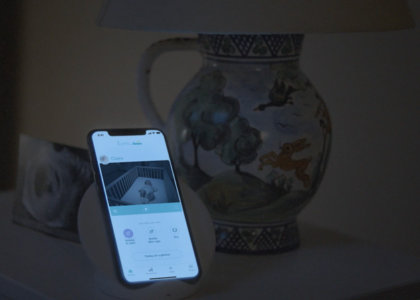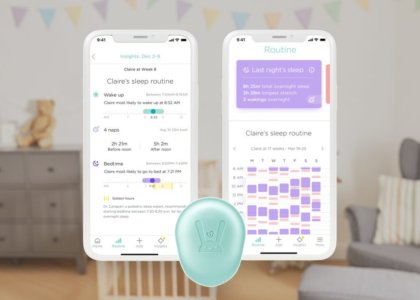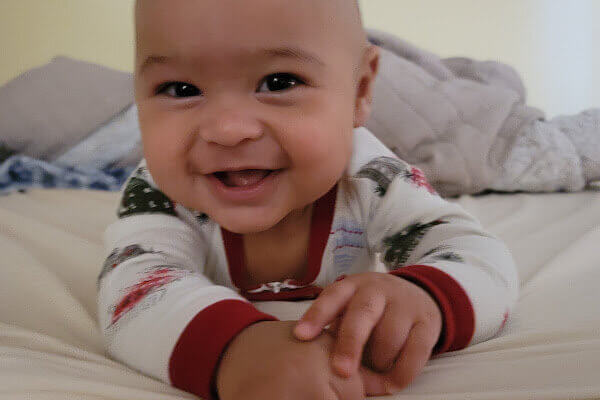As a new parent, you’re all too aware that you’re not getting enough sleep, but whether or not your baby is sleeping properly can be more difficult to determine. Adequate sleep is vital to your baby’s health and wellbeing. Knowing how much sleep your baby should be getting and the signs of sleep deprivation can help ensure your little one is getting the rest baby needs to grow and thrive.
How Much Sleep Does My Baby Need?
All babies are unique, so there is no definitive amount of sleep your child needs. However, there are expert-recommended guidelines that can help you determine the amount of sleep that’s best for your baby.
Newborn-3 Months
Typically, babies who are newborn to 3 months old will sleep 14-17 hours a day, including 2-5 naps. It’s not uncommon for a child this age to sleep more than 17 hours a day, but extra sleep can interfere with feeding. Watch your baby’s weight to ensure they’re getting enough nutrition.
3-6 Months
As babies begin to settle into a routine around 3-6 months, they will sleep around 12-16 hours a day and take about three naps. This is an excellent time to establish a baby nap and sleep schedule utilizing Lumi by Pampers award-winning smart monitor and sleep system so you can anticipate baby’s needs and create routines.
6-12 Months
Once your infant has reached 6-12 months, they’ll be clocking approximately 12-16 hours of sleep in 24 hours, but they will likely sleep for more extended periods. Your baby may also begin to sleep through the night.
If your son or daughter was born premature, they’ll likely sleep more than a baby that was carried to full-term and will take longer to achieve those extended periods of nighttime sleep.
In addition, because formula takes longer to digest than breast milk, bottle-fed babies also tend to wake up less and sleep for more extended periods than breastfed babies.
Signs of Sleep Deprivation
If you suspect your child isn’t getting enough sleep, there are a few signs to watch for.
Fussiness
Fussing is one way that babies communicate their needs. However, if your baby tends to be fussier than usual, it might be a sign that she’s not getting enough sleep.
Difficulty Settling Down at Night
Just like adults, when babies get overtired, they often become overstimulated and have difficulty falling and staying asleep.
Very Short Naps
If your baby isn’t napping for reasonable amounts of time, it could lead to sleep deprivation. Newborns may only sleep for 10-15 minutes at a time, but by three months, 30-45 minutes per nap is more common. Once your baby reaches seven months old, you can expect them to sleep for an hour or more at a time.
“Sleepy” Gestures
Over time, you’ll learn to recognize your baby’s distinct signals that he’s tired. Some common gestures that may indicate it is naptime include yawning, fluttering or rubbing their eyes, and tugging their ears.
Lack of Interest in People or Their Environment
The amount your child interacts with their world depends on their age and stage of development, but if your baby is demonstrating lethargy or lack of interest that seems uncharacteristic, it could be a sign of sleep deprivation.
Ensuring Your Baby Gets Adequate Sleep
If you notice that your baby appears sleep deprived or they are transitioning between sleep programs, there are some things you can do to ensure your baby is sleeping enough.
Invest in a Smart Baby Monitor
One of the best ways to make sure your baby is getting plenty of rest is to create healthy, independent sleep patterns. A baby monitor allows you to check on your baby without disrupting their nap and sleep schedule. The Lumi Smart Baby Monitor is one of the most clear and reliable WIFi baby monitors on the market.
Lumi allows you to hear and speak to your baby from another room using the two-way monitor, and it features 1080p HD resolution so you can get a crystal clear image of your baby. The dual audio/video is encrypted and securely streamed to your phone or device, so you can check on your baby whenever necessary.
 The monitor base/camera is portable, so you can easily move it from the nursery to the living room if your baby unexpectedly falls asleep in their swing or bouncer.
The monitor base/camera is portable, so you can easily move it from the nursery to the living room if your baby unexpectedly falls asleep in their swing or bouncer.
Combine the Lumi Smart Baby Monitor with their Smart Sleep System to get personalized sleep insights, all-in-one app access to baby’s activity, and monitor nursery conditions like the temperature and humidity levels.
The Smart Sleep System comes with a video coaching series filled with step-by-step instructional talks from pediatrician experts and an innovative sleep sensor which attaches to your baby’s diaper. The coaching series and smart sleep sensor work together to help parents get their baby to sleep easier and faster by helping them understand their baby’s sleep and where and how to intervene.
Establish a Sleep Schedule
A sleep schedule can also help your baby meet their sleep needs. A baby nap and sleep schedule establishes the consistency your baby needs to get regular, restful sleep. Use the video coaching series included in the new Smart Sleep System to learn proven methods on how to form nap and sleep schedules that nurture baby’s sleep. Eight out of ten parents say Lumi helps them build routines so their babies sleep longer.
 Every baby is different, so setting a schedule for your infant may take some trial and error. But once you have a routine, stick with it. Try not to skip naps or keep your baby up too late at night. They’re likely to become overtired or overstimulated, making it difficult to get them to sleep at night.
Every baby is different, so setting a schedule for your infant may take some trial and error. But once you have a routine, stick with it. Try not to skip naps or keep your baby up too late at night. They’re likely to become overtired or overstimulated, making it difficult to get them to sleep at night.
Create a Calm Environment
Creating a restful routine and environment for baby’s nap and bedtime can signal to your baby that it’s time to sleep. Their sleep space should be soothing and peaceful. In the nursery, use subdued colors and avoid overstimulating decor that can distract your baby and make it harder for them to drift off.
Have a consistent plan for bedtime each evening. You can begin by giving baby a warm relaxing bath, followed by a story or some gentle singing. The routine will help train your baby’s body to know that it’s bedtime.
Talk to Your Doctor
It’s entirely normal for your baby to become overtired on occasion, and transitions between sleep programs as your baby grows can cause slightly abnormal sleep patterns. However, if you are concerned about your baby’s particular sleep habits, discuss them with your healthcare provider at your next check-up.
The Takeaway
Sleep issues are common in babies, so you will likely have a tired baby from time to time. The Lumi by Pampers Smart Sleep System combines pediatrician-backed sleep tips with personalized insights into your baby’s unique habits so parents can understand where and how to intervene and track their baby’s sleep progress ongoing.




